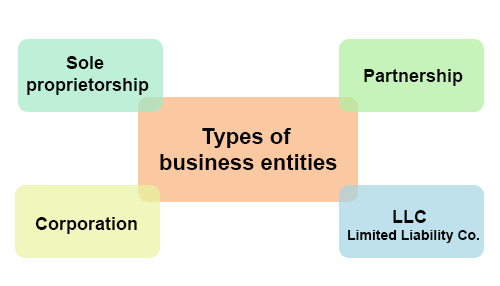It could be that you want to expand your hobby and convert it into a business. There are different types of business entities that can be formed. The types of business entities that you adopt are likely to affect several factors, some of which might determine your company’s future. It is important to align your goals & objectives with your business type. Hence, it becomes crucial to know the pros & cons of each entity so as to make the right decision.
How is a company’s form likely to be affected?
- Tax
- Formation cost
- Legal liability
- Operational costs
Types of Business entities & their pros & Cons
-
Sole proprietorship:
Pros:
- Owner enjoys all profits
- Little regulation
- Total flexibility to run business
- Simple business license to start operation
Cons:
- 100% liable to meet all business debts.
- Proprietor ownership is non-transferable.
- Distinction does not present business or personal income.
- Equity is limited to the personal resources of the owner.
- Your business is entirely dependent on your decisions.
-
Partnership:
In such business entities, there are two types of partnerships, viz., limited & general.
Pros:
- Total profits earned by the company are distributed among each partner.
- Shared resources provide businesses with more capital.
- Partnership business, be it informal or formal, is expensive to establish.
- Simple design & flexibility are similar to proprietorships.
Cons:
- Losses & debts are to be borne by each partner.
- If any partner wants to end the business, then the partnership ends.
- It is difficult to sell off the business. A new partner needs to be found.
-
Corporation:
Pros:
- The corporation owns all profits & losses generated by the business.
- The owner enjoys limited liability for losses or debts.
- Transferable to new owners without much hassle.
- Business debts are not payable by seizing the personal assets of the owner.
Cons:
- Expensive operations.
- Setting up this form of business is expensive.
- Complex paperwork is necessary to initiate corporate business.
- Income gets taxed twice, with some exceptions.
-
LLC (Limited Liability Co.)
Pros:
- LLC profits shred among owners, but without facing double taxation.
- Company owners experience limited liability for losses or debts.
Cons:
- Certain state laws limit ownership.
- Complex & comprehensive agreements.
- There are high costs involved in setting up an LLC because of the filing and legal fees involved.
To know which of the business entities to choose for your business, consult industry experts.



